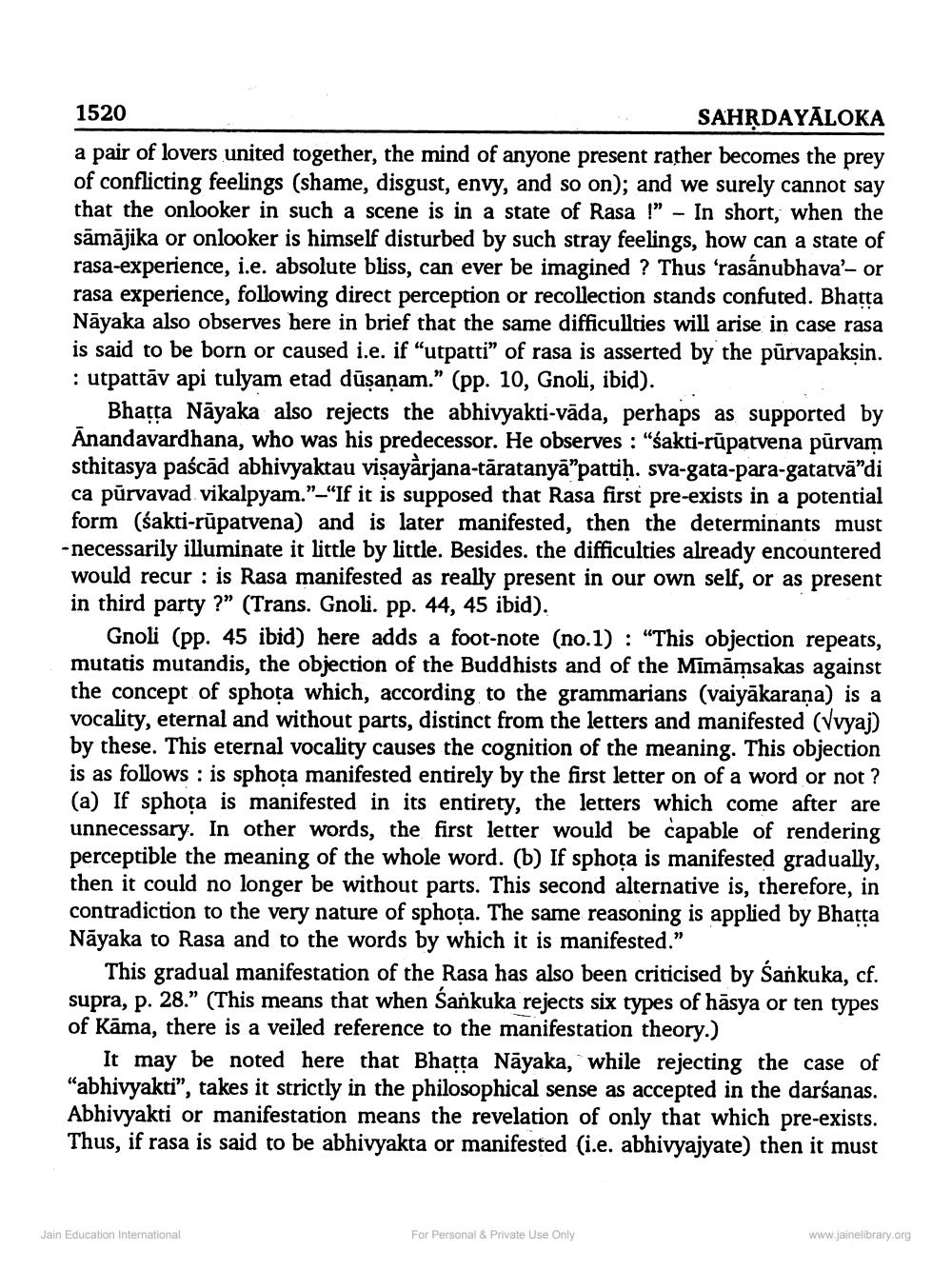________________
1520
SAHṚDAYALOKA
a pair of lovers united together, the mind of anyone present rather becomes the prey of conflicting feelings (shame, disgust, envy, and so on); and we surely cannot say that the onlooker in such a scene is in a state of Rasa !" - In short, when the sāmājika or onlooker is himself disturbed by such stray feelings, how can a state of rasa-experience, i.e. absolute bliss, can ever be imagined? Thus 'rasanubhava'- or rasa experience, following direct perception or recollection stands confuted. Bhatta Nayaka also observes here in brief that the same difficullties will arise in case rasa is said to be born or caused i.e. if "utpatti" of rasa is asserted by the purvapakṣin. : utpattāv api tulyam etad dūṣaṇam." (pp. 10, Gnoli, ibid).
Bhaṭṭa Nayaka also rejects the abhivyakti-vāda, perhaps as supported by Anandavardhana, who was his predecessor. He observes: "śakti-rūpatvena pūrvam sthitasya paścād abhivyaktau visayarjana-tāratanya"pattiḥ. sva-gata-para-gatatvā"di ca pūrvavad vikalpyam."-"If it is supposed that Rasa first pre-exists in a potential form (śakti-rūpatvena) and is later manifested, then the determinants must -necessarily illuminate it little by little. Besides. the difficulties already encountered would recur is Rasa manifested as really present in our own self, or as present in third party?" (Trans. Gnoli. pp. 44, 45 ibid).
Gnoli (pp. 45 ibid) here adds a foot-note (no.1): "This objection repeats, mutatis mutandis, the objection of the Buddhists and of the Mimāmsakas against the concept of sphota which, according to the grammarians (vaiyākaraṇa) is a vocality, eternal and without parts, distinct from the letters and manifested (√vyaj) by these. This eternal vocality causes the cognition of the meaning. This objection is as follows is sphota manifested entirely by the first letter on of a word or not? (a) If sphota is manifested in its entirety, the letters which come after are unnecessary. In other words, the first letter would be capable of rendering perceptible the meaning of the whole word. (b) If sphota is manifested gradually, then it could no longer be without parts. This second alternative is, therefore, in contradiction to the very nature of sphota. The same reasoning is applied by Bhatta Nayaka to Rasa and to the words by which it is manifested."
This gradual manifestation of the Rasa has also been criticised by Śankuka, cf. supra, p. 28." (This means that when Sankuka rejects six types of hasya or ten types of Kāma, there is a veiled reference to the manifestation theory.)
It may be noted here that Bhatta Nayaka, while rejecting the case of "abhivyakti", takes it strictly in the philosophical sense as accepted in the darśanas. Abhivyakti or manifestation means the revelation of only that which pre-exists. Thus, if rasa is said to be abhivyakta or manifested (i.e. abhivyajyate) then it must
Jain Education International
For Personal & Private Use Only
www.jainelibrary.org




